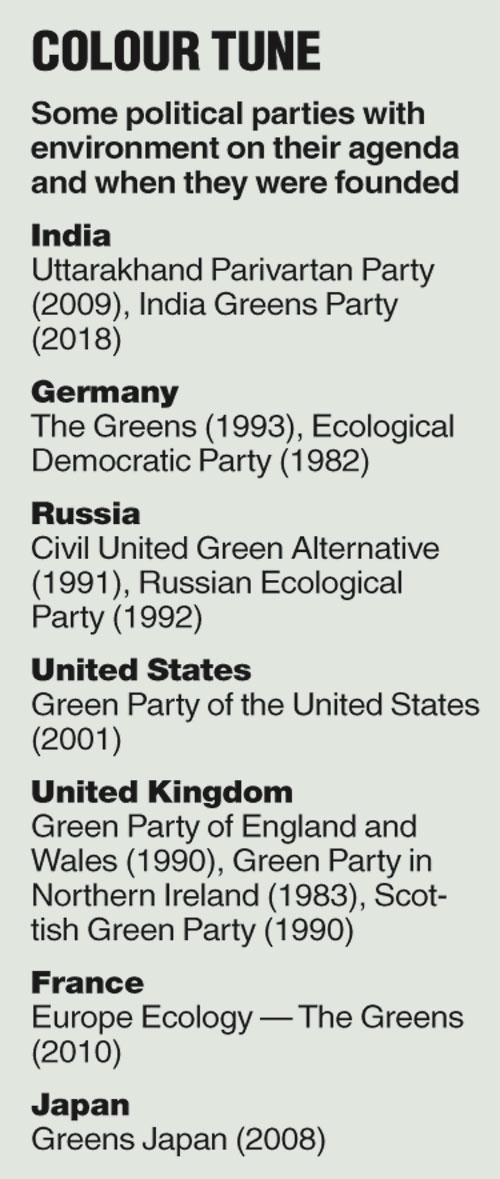At first glance there is no telling that the man in blue is the green candidate — Independent — for Calcutta South. Niraj Agarwal, who contested this Lok Sabha seat against heavyweights such as the Trinamul’s Mala Roy and the BJP’s Chandra Bose, looks the corporate type that stays a mile away from issues political.
“I got into this because I wanted my children to grow up in a cleaner environment… You have to relate to something in order to champion it,” says the 37-year-old cyber security expert. Agarwal, who polled a mere 1,658 votes, did not contest these elections thinking he would pull off a big win, but he did know what he was doing. He says, “The idea was to use the momentum around elections to shake up people into thinking that the environment should be an election issue, at whatever level.”
From what Agarwal says about his campaign, he practised what he preached. He, along with his friends, wore masks with the message “Vote For Environment” and ran a zero carbon footprint campaign — basically, no paper. He says, “Parties take out pamphlets and newspaper inserts. These are definitely effective ways of reaching out to a votebank but these methods would go against the very cause I am fighting for. So I did everything digitally including carrying the electoral rolls on my tablet.”
Agarwal’s election symbol was a pair of binoculars. “Someone suggested an hourglass to show time is running out; someone else a torch to show light, or a spanner to mean we will fix things,” he says. Finally, he settled for what he thought best represented foresight. His campaign tagline read: A party candidate works for the party and an Independent candidate works for you.

The Telegraph
Once the general elections were announced, Agarwal studied the party manifestos and was disappointed. He says, “In the BJP manifesto, there was a fleeting mention of air pollution and the National Clean Air Programme. But it was just another policy document rustled up in time for the elections. I also studied the feedback of environmentalists. Even they felt it was all hogwash. The regional parties did not mention environment at all. That’s when I thought, why should we wait for another five years and another party and another individual to realise that there is an environment problem? The leaders are not waking up, at least the electorate should wake up and understand that whoever they elect must be aware of these issues.”
Agarwal has two decades of volunteering experience. He has rallied for issues as varied as the uplift of underprivileged children, feeding the hungry, rehabilitating destitute children found in and around railway stations. Sometime in early 2018, he started an online project called India Against Pollution. It was about raising awareness of the battered environment to a degree that citizens demanded more action from elected governments. “The greater the awareness, the more will be the pressure on the government,” he says.
The poll issues Agarwal fought on were an extension of these things. His 15-point manifesto covered pollution, of all kinds; rising costs, poor quality of education; affordable healthcare; vanishing greenery; public space encroachments and so on and so forth. His campaign website was called VIKALP, an acronym for Vote Independent Ko At Lok Sabha Polls. He explains, “Vikalp also means alternative. We wanted to give people an alternative way of looking at politics. Personal attacks and mud-slinging that happens in Indian politics is not required. We need more issue-based elections.”
Agarwal says, prior to this he had little clue about the entire election process, from nomination to research. But even when things were getting difficult, Agarwal says he knew he would make a statement just by contesting these elections. He says, “And that statement would be that a well-read and well-qualified citizen can also be a part of politics and act as a change-maker.”
Some people got his point, but it became apparent to Agarwal that even they would not cast their votes in his favour. He says, “People would ask me if I was getting money for this, if I was a proxy candidate, if I was there to cut into the BJP’s votes. Some of my friends told me they understood the importance of my green campaign but they would not vote for me because they were going to vote for Narendra Modi. This election was completely polarised at many levels.” Before result day, he called other candidates and requested each of them to make environment the priority, whoever got the people’s mandate.
Agarwal lost his deposit but it does not seem to have cast a shadow on his enthusiasm. He says, “There is a huge awareness gap that has to be filled. We need to take action, not only at our own level but also demand it from our leaders so they are compelled to do something. We are planning to petition all 543 MPs and ask for their (green) roadmap.” He pauses and continues, “Just like parties are fighting against each other to put money in our bank accounts, we want parties to compete with each other on who will plant more trees.”











